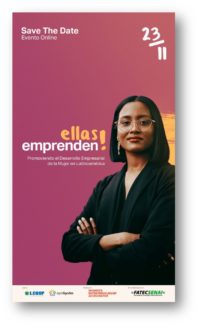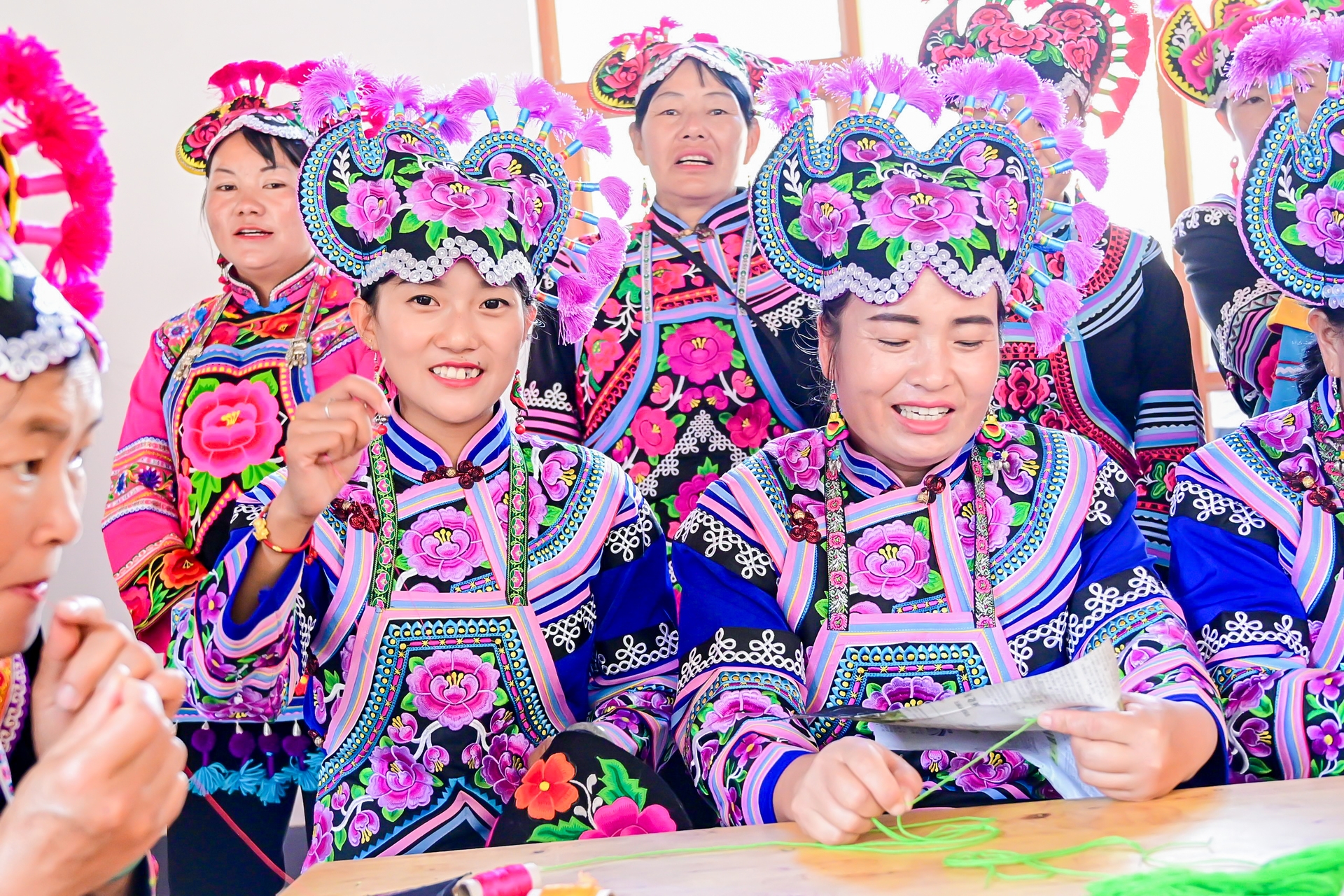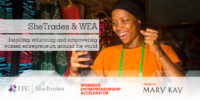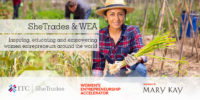Our Work
Shaped with a unique focus on gender, our programmes and products are the joint outcome of the collaboration between the International Labour Organization (ILO), the International Trade Centre (ITC), International Telecommunication Union (ITU), the United Nations Development Programme (UNDP), the United Nations Global Compact (UNGC), and UN Women.
Bridging the Digital Gender Divide
Project: Online Entrepreneurship Certificate Programme
Partner: ITC She Trades
The Women’s Entrepreneurship Accelerator offers its first ever free online Entrepreneurship Certificate Programme. This unique Certificate Programme aims to teach women entrepreneurs the skills to design and set up businesses that have potential to be economically viable.
Developed by International Trade Centre (ITC) SheTrades and powered by Mary Kay in support of WEA, the guided Entrepreneurship Certificate Programme includes 27 interactive modules enriched with over 200 videos covering seven key stages of business development.
It is free for all users of shetrades.com with no barrier to entry and currently available in English, Spanish, and French, with Arabic, Russian and Mandarin coming in 2022.
Participants will learn how to adopt an entrepreneurship culture, develop ideas through design thinking and lean start-up methodologies, prepare a business model canvas, design a pitch, identify sources of funding, find the right partners, arrange for mentorship, build a team, and set up their businesses…
A certificate is granted to learners upon completion of each of the seven key stages of business development.
To learn more or enroll click here: (https://www.shetrades.com/#/publiclearn)
The contribution falls under ITC’s “Empowering Women to Trade Programme” which contributes directly to ITC’s focus area 5 “Promoting and Mainstreaming Inclusive and Green Trade” and United Nations Sustainable Development Goals (SDGs) 5, 8 and 17.
Digital Gender Divide
Project: Bridging the Digital Gender Divide
Partner: International Telecommunication Union
The A contribution to the Women’s Entrepreneurship Accelerator, the “Bridging the Digital Gender Divide” project led by the International Telecommunication Union (ITU) is a response through capacity building to the urgent need to bridge the digital gender divide and equip women entrepreneurs around the world with the necessary digital skills for their own economic empowerment.
In 2022-2023, in direct support of WEA, ITU will offer access to a high-quality digital skills training program to young women entrepreneurs and experienced women entrepreneurs from developing and least developed countries. ITU will also organize an annual open innovation competition where pre-selected winners will be brought together to develop a women empowerment ecosystem.
This contribution will help showcase the importance of providing digital skills for young women and women entrepreneurs with the end goal to increase business performance. It will promote digital innovation in the entrepreneurial ecosystem of women and their collaboration with governments, private sector, and civil society.
Innovation Ecosystem
Project: Efficient advocacy through WEDs Methodology
Partner: International Labour Organization
Today more than ever, it is critical to strengthen advocacy for Women’s Entrepreneurship Development (WED). The International Labour Organization (ILO) uses its Women’s Entrepreneurship Development (WED) assessment methodology to identify gender-based inequality gaps that prevent women from starting their own businesses. The agency leverages the findings of WEDs to make recommendations for governments and corporates on how to eliminate barriers to achievement.
In 2021, in Mexico, the ILO has conducted an assessment on framework conditions that impact women’s entrepreneurship development in support of the Women’s Entrepreneurship Accelerator.
The study is sector specific to trade and industry in Mexico City and touches upon the impact of COVID-19. The assessment includes a series of actionable recommendations for a more conducive environment, developed in close collaboration with national partners, including employers’ associations, chambers of commerce and associations of women entrepreneurs to ensure national ownership and sustainability.
In Brazil, through the Accelerator, ILO is collaborating with SENAI, a national leader in technical and vocational training, to advocate for women’s entrepreneurship development and foster dialogue based on the findings of a WED Assessment conducted in the framework of the EU-funded Win-Win project. A programme of national and regional conferences, seminars, trainings, and communication campaigns has been put together to generate and consolidate momentum in favor of women’s entrepreneurship development.
To learn more about women entrepreneurship development in Brazil:
• Watch a 1-minute inspirational video created by Fatec Senai to promote women entrepreneurship in support of in Brazil.
• Watch « Elas Empreendem », a 15-minute documentary featuring women entrepreneurs in Brazil.

Gender-responsive Procurement
Project: Community of Practice Engaging the Private Sector and & Global Advocacy Tool kit
Partner: UN Women in collaboration with UNGC
Gender-responsive procurement (GRP) can have a transformational impact on domestic and international economies and contribute to women’s economic empowerment. Globally, one in three small, medium, and large businesses are owned by women , yet women win only 1% of the procurement spend of large corporations and governments .
The Women’s Entrepreneurship Accelerator is focused on doing concrete work and advocating for the building of transformative strategies to advance gender-responsive procurement (GRP) within both private and public sectors. Our aim is to create awareness around the complex and interconnected barriers of women’s entrepreneurship and to promote GRP practices globally.
Establishing the Business Case for GRP globally
In support of the Accelerator, UN Women has been working towards establishing the Business Case for GRP through the launch of a community of practice (CoP) in July 2021 in collaboration with UN Global Compact to engage stakeholders from the private sector.
UN Women, with the support of the UN Global Compact, has also conducted a global survey across sectors on GRP. UN Women has interviewed more than 50 companies and organizations, which, together with the survey responses, will result in case studies and an evidence-based advocacy tool to highlight the business case of GRP. The advocacy tool will be a contribution to the Accelerator in support of UN Women’s Flagship Programme Initiative “Stimulating Equal Opportunities for Women Entrepreneurs.”
Gender-responsive Procurement
Project: Building Procurement Capabilities for Women Entrepreneurs and the Private Sector in Europe and Central Asia Region
Partner: UN Women Europe Central & Oriental
UN Women Europe and Central Asia (ECA) has designed inaugural Pilot programme to increase the capacities of both women entrepreneurs and private sector with an aim to boost women’s entrepreneurship: (1) Building procurement capacities of women entrepreneurs to compete for bidding opportunities with public and private sectors; (2) Strengthening capacities of the private sector entities from all the sectors to establish policies and practices and design initiatives on gender responsive procurement and investment.
Formalization
Project: SDG Pilot Village in Waipula, Yunnan Province, China
Partner: UNDP

In July 2017, the United Nations Development Program (UNDP) launched its first Sustainable Development Goals (SDGs) Pilot Village targeting women’s poverty and sustainable development in Yunnan Province, China with support and funding from Mary Kay.
The site selected was Waipula, in Yongren County, Chuxiong Prefecture, Yunnan Province: Waipula is an impoverished village which was listed as a national traditional village protection project in 2016.
The SDG Pilot Village in Waipula is the first-of its-kind pilot program focused on entrepreneurship as a pathway to empowerment.
The funds provided by Mary Kay for were invested in improvements to the village’s health-care system, cultural preservation efforts and overall business development in the village. Women were encouraged to engage in ecotourism that showcases their unique cultural heritage, such as ethnic Yi embroidery.
The SDG Pilot Village Project is the first village-level initiative to demonstrate how the SDGs can be successfully implemented locally in rural China. From 2017 to 2020, the initiative directly contributed to 12 of the 17 Sustainable Development Goals.
The Women’s Entrepreneurship Accelerator will work with UNDP, UN Women, and partners towards scaling this initiative globally in 2022 and beyond.




